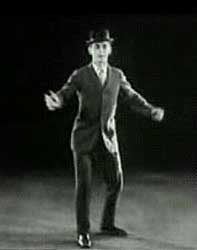 A Few Moments with Eddie Cantor (1923) is an early talkie filmed by the "phonophone" process, capturing comediene Eddie Cantor in his prime.
A Few Moments with Eddie Cantor (1923) is an early talkie filmed by the "phonophone" process, capturing comediene Eddie Cantor in his prime.
He's performing a fragment of the Broadway review Kid Boots & was filmed at Rivoli Theater in 1923.
This very early soundie is nearly seven minutes long, & such a treat to have his voice coming down to us from the height of the silent era.
Eddie wasn't really one of the comics who made the transition from vaudeville to films nor from films to early television, as his entertainment style lovingly spoofed New York ethnic immigrants, which producers never believed could be sufficiently universal.
He stands center stage & tells some jokes & sings "The Dumber They Are, the Better They Make Love" & "Oh, Gee, Georgie." The jokes were old even in '23, but the vaudevillian tunes are super.
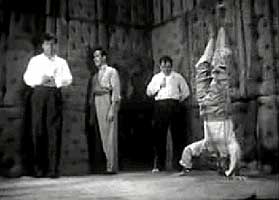 The Hut-Sut Song (1941) features Charles Judels & the King's Men, who made several soundies in the late 30s & early 40s.
The Hut-Sut Song (1941) features Charles Judels & the King's Men, who made several soundies in the late 30s & early 40s.
"Song becomes national disease!" warns the Hollywood Post headline. Less than three minutes, The Hut Hut Song is a great novelty swing-tune, performed by excentric weirdos in various situations such as a dinner party, a game of cards, & so on.
Whatever they do, they cannot stop singing "The Hut Hut Song (A Swedish Serenade)," which was written by Leo V.Killion, Ted McMichael & Jack Owens, with bouncy swing beat & the silly lyrics: "Hut-sut Rawlson on the rillerah & a browla, brawla soo-it," & explains the lyrics at the bridge.
The song infects everyone who hears it & spreads like a virus. In the end the King's Men are carted off to the insane asylum & put into a padded cell, still singing madly.
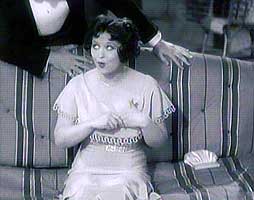 A Lesson in Love (1931) is a one-reel musical short starring Helen Kane who, in the 1920s, had been the biggest flapper star, whose appearances could cause rioting in the streets. A Lesson in Love (1931) is a one-reel musical short starring Helen Kane who, in the 1920s, had been the biggest flapper star, whose appearances could cause rioting in the streets.
Then in the 1930s, her image & childlike Bronx voice became coopted for the Betty Boop cartoons. In the 1940s she partially inspired the character of Tweetie Bird, whose catch phrase, "I Taut I Taw a Puddy Tat" had been a hit song for Helen.
It's often said that the Fleischer brothers destroyed Helen Kane's career by appropriating her voice & caricaturing her as Betty. As the cartoons got wider distribution than Helen could personally reach, people began to believe Helen was a Betty impersonator rather than the other way around.
Yet it might've been that Helen's popularity was doomed in any case, because her style of ragtime was on the decline as a new swing style was rising. Also at a plump five feet height, she must've been cute as a button on the live stage singing at top New York venues, but her misfired film career revealed her as double-chinned & just maybe insufficiently photogenic for the intimacy of motion pictures close-ups.
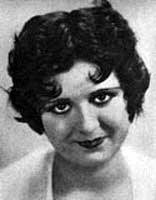 Whether her career would've declined as swiftly without Betty Boop is impossible to know, but in her last movie, A Lesson in Love, we don't get a lot of assurance that she could be dynamite on the screen. Whether her career would've declined as swiftly without Betty Boop is impossible to know, but in her last movie, A Lesson in Love, we don't get a lot of assurance that she could be dynamite on the screen.
She plays ditzy college student Helen Lane. In one college class, she cannot hide the crush she has on the professor, whose lecture is on the philosophy of love. The professor however is short-tempered with her because she's such a poor student. Her input so disrupts the classroom with students' laughter that he kicks her out of the class.
At a student dance that night she beats off a drunken masher, then spots Professor Hodgekiss, & her crush is rekindled despite that he had been abusive toward her in class.
He breaks down & confesses he has a crush on her, too, & that her ditzy ways actually make him feel happy in his stodgy world. Of course the propriety of teachers making time with students is not addressed.
She's soon singing to him "I Love Myself Because You Love Me," a delightful song with lyrics such as "I love my walk & my baby talk." While she's singing she comes alive & is an exciting screen presence. But for the rest of the film, her character's stupid-act, & her ending up in the arms of a lecherous old coot, don't make the film an overall success.
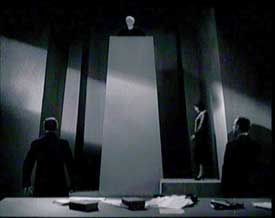 A one-reel musical short opening in a bizarre expressionist court is Her Future (1930). This sequence may well have inspired the courtroom seen in an episode of Rod Serling's The Twilight Zone called "The Obsolete Man."
A one-reel musical short opening in a bizarre expressionist court is Her Future (1930). This sequence may well have inspired the courtroom seen in an episode of Rod Serling's The Twilight Zone called "The Obsolete Man."
Ethel Merman -- young, slim & gorgeous -- stars in what appears to be her first film appearance, before she reached Broadway & super-stardom.
She is the defendant in the kafkaesque courtroom, asked by the judge to explain how she arrived at this sorry juncture of her life.
She thus bursts into song, a dramatic vaudeville ballad "My Future Just Passed" with the line, "Gone are my schemes, & my dreams, & my rainbow." The song was written by George Marion Jr. & Richard A. Whiting, & debuted that year in the feature length musical comedy Safety in Numbers (1930).
The judge is sufficiently impressed by her musical autobiography that he suspends her sentence. He wants to know what she'll do with this second chance.
That's her cue to sing to jumping dixieland homage "Sing You Sinners" which had been a hit for Lilian Roth that year, & became an often-covered instant classic.
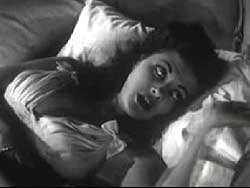 Lamp of Memory (1942) stars Yvonne DeCarlo in her sexy nightgown climbing into bed, hot cha cha cha.
Lamp of Memory (1942) stars Yvonne DeCarlo in her sexy nightgown climbing into bed, hot cha cha cha.
She sings the title ballad exceedingly well, though there's a chance it's not the famous actress singing, but actually Harriet Cruise, who never got credit when she made actresses look like good singers.
Then as she falls asleep, a chorus of guys (it's The King's Men) takes up the song, & Yvonne rises from her own body as a transparent dreaming spirit; if soundies weren't so upbeat, it'd be like she had a heart attack & that's her ghost.
Still in her nighty which doubles fine as an evening gown, she goes out on the terrace, no longer transparent, & dances with Russell Mercer who is wearing a Latin lover costume.
DeCarlo's a wonderful dancer & this three-minute soundie is simply a good "sampler" of her four excellent abilities as actor, dancer, singer, & pin-up babe, whether or not that's actually her singing. Mercer keeps his performance subdued so as not to steal the limelight, & the Latin-beat music is provided by Spike Jones & His Band.
She then awakens to finish the song with lyrics like "Is my imagination taking pity on my heart," with a last-moment special effect of Yvonne & Russell kissing in the "memory" of the end-table light's glowing lamp-shade.
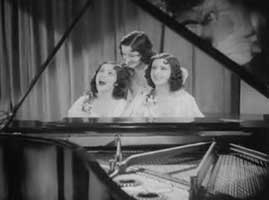 In Heebie Jeebies (1932), three lovely gals -- Connee, Vet & Martha, i.e., the Boswell Sisters -- are sitting at a piano singing an excellent rendition of "Heebie Jeebie Blues," a fantastic jitterbug number which they'd recorded with Okeh Records in 1930, & had a great hit of it.
In Heebie Jeebies (1932), three lovely gals -- Connee, Vet & Martha, i.e., the Boswell Sisters -- are sitting at a piano singing an excellent rendition of "Heebie Jeebie Blues," a fantastic jitterbug number which they'd recorded with Okeh Records in 1930, & had a great hit of it.
The anonymously directed soundie runs a scant minute forty seconds. Although it's unusually short even for a soundie (even the shortest ones tended to be no less than two & three-quarters minutes at minimum), it has been said to best represent their stage presence in the early '30s. It was initially made to promote The Big Broadcast (1932), but was not released for that use. It was finally released in 1937.
The Boswell Sisters harmonized as only family members can, but did it better, having a real genius for arrangement (which they did themselves), & a sound that was much imitated but never imitative. Connee is the one that gets the most solo time, as well she might. No less a singer than Ella Fitzgerald said, "There was only one singer who influenced me...Connee Boswell."
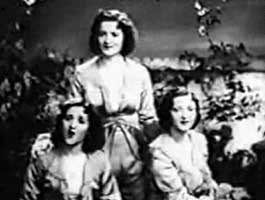 The Boswell Sisters also star in a Fleischer Brothers "bouncing ball" sing-along, performing the titular song, Sleepy Time Down South (1932). A one-reeler, it starts off as an animated cartoon featuring Bimbo the dog as a fireman who saves the fully animated Boswell Sisters from the fire. The Boswell Sisters also star in a Fleischer Brothers "bouncing ball" sing-along, performing the titular song, Sleepy Time Down South (1932). A one-reeler, it starts off as an animated cartoon featuring Bimbo the dog as a fireman who saves the fully animated Boswell Sisters from the fire.
There's a four minute version in circulation that deletes almost the entire animated portion except a few seconds of the animated Boswells as they enter a park.
They go into a park where they find a bench & a piano. Then the actual Boswell Sisters are superimposed on the animation, & they begin singing. Although he's not shown, the guitar accompaniment is by Eddie Lang.
They begin with a long introduction of their own charming harmonized scat. This is followed by a swing-jazz introductory invitation to a sing-along, "Sing along, one & all/ With the little, balzy-ball." At last they go into the bouncing-ball number, which they keep simple so that the audience really could sing too.
The song, written by Leon Rene, Otis Rene & Clarence Muse, has lovely lyrics just slightly changed in modern renditions which prefer to change one word to "folks croonin'": "Pale moon shining on the fields below/ Darkies croonin' soft & low/ You needn't tell me honey 'cause I know/ It's a sleepy time down South."
After their scatting jazzy opening, the sing-along portion comes off a little Lawrence Welkish, & not as original as their jivin' Heebie Jeebies soundie. But for the most, they're kind of like the Andrew Sisters with less kitsch than the Andrews; or, what the Andrews did at the height of commerciality the Boswells did as vocal art.
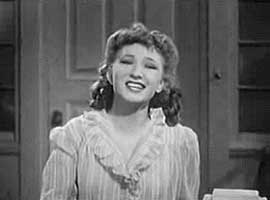 The title song from Chime Bells (1943) is performed by Rosalie Allen, a young yodel-singer, in an under-three-minute soundie framed by the sad implications of a girl's beau preparing to head off for war.
The title song from Chime Bells (1943) is performed by Rosalie Allen, a young yodel-singer, in an under-three-minute soundie framed by the sad implications of a girl's beau preparing to head off for war.
A later yodeling song also called "Chime Bells" from 1953 is entirely different. The lyrics here run "Chime-bells are ringing yodel-odle-oh-oh-tee/ My heart is singing yodel-odle-oh-oh-tee" & it's a lovely old fashioned rendition.
Her anonymous co-star also sings. This is not Elton Britt with whom Rosalie recorded just such duets. The unknown male singer is less amusing as he doesn't yodel, & certainly sings less well, with his lines stuff like "Goodbye my darling my country needs me." It comes off partly as a mere advertisement for signing up to fight, & the song's only fun for the yodeling.
A year after she made this film, Rosalie took a radio job for WOV in New York City & became a famous western disc jocky locally. She was inducted in the Western Disc Jocky Hall of Fame in 1999.
copyright © by Paghat the Ratgirl
|
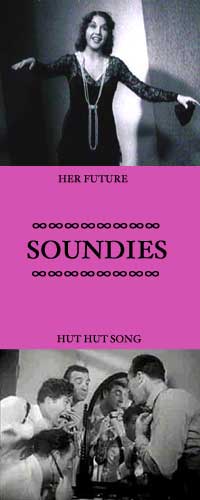



 Whether her career would've declined as swiftly without Betty Boop is impossible to know, but in her last movie, A Lesson in Love, we don't get a lot of assurance that she could be dynamite on the screen.
Whether her career would've declined as swiftly without Betty Boop is impossible to know, but in her last movie, A Lesson in Love, we don't get a lot of assurance that she could be dynamite on the screen.



